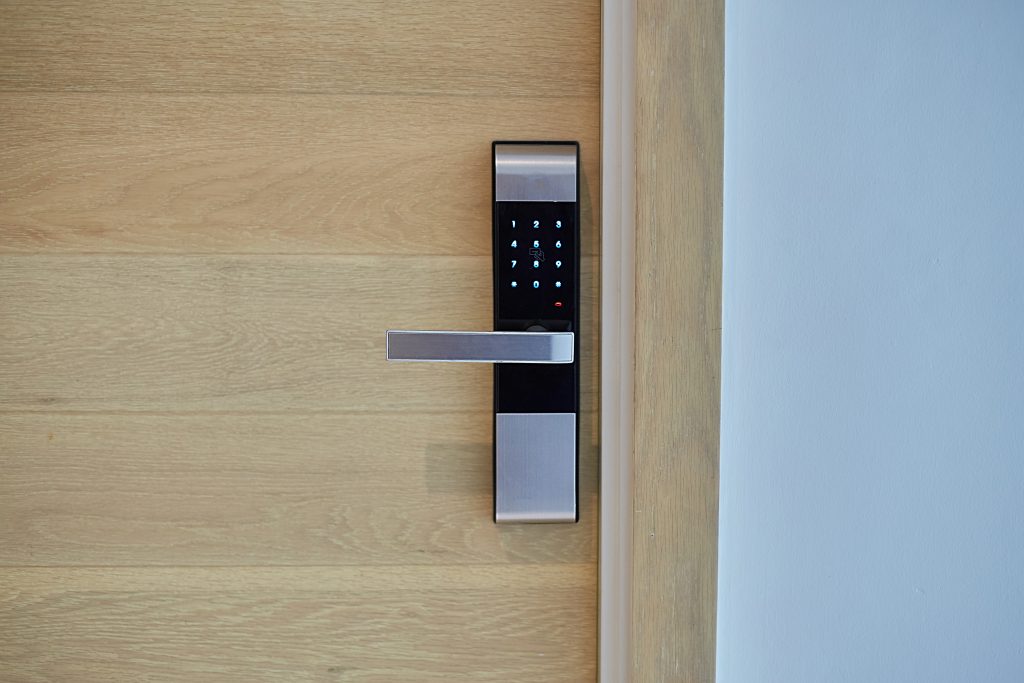
As a business owner or building manager, there are a lot of responsibilities to keep up with, right down to the nuts and bolts — literally. The type of lock on your commercial doors may not be something you put a lot of thought into. However, they are a critical part of your business.
From security and durability to legal requirements, there’s a lot at stake when it comes to selecting locks for commercial doors. Read on to learn more about what types of locks are required in a commercial setting.
The Americans with Disabilities Act (ADA) has been in effect since the 1990s and aims to make infrastructure more accessible. Things like automatic doors and ramps are usually associated with ADA compliance, but there are requirements for door locks as well.
The ADA requires that commercial buildings enable those with limited mobility to safely exit in the event of an emergency. Therefore, door locks that meet ADA guidelines must be installed so anyone with a disability can unlock the door and exit.
According to government guidance, this means that all locks and handles must be operable with one hand and must not require any unusual maneuvering, extreme twisting, or strength. This limit ensures that people with disabilities can easily unlock doors in the event of an emergency without the assistance of another.
In addition, no lock hardware can be mounted more than 48 inches above the floor. This requirement ensures that persons in wheelchairs are able to reach the door to unlock it.
For commercial buildings, the most common types of locks that meet ADA compliance are:
Round door knobs do not meet compliance standards.
No matter what type of business you run, your building must meet these requirements. Failure to install ADA-compliant locks can open you up to litigation or put your local business license at risk.
The American National Standards Institute (ANSI) is a U.S.-based, non-profit organization that oversees the development of standards for products and services, including locks.
ANSI has developed a standardized grade methodology that measures the strength and durability of locks and categorizes each lock type as Grade 3, Grade 2, or Grade 1.
Grade 3 is the least secure type. It does not include any anti-pick or enhanced security features and is often the cheapest alternative. These locks are most commonly found in residential settings and are not recommended for commercial buildings.
Grade 2 is the next level up and includes enhanced security features that make a breach less likely. All Grade 2 locks exceed residential requirements but are not recommended for commercial buildings.
Grade 1 is the most secure type of lock and is tested to withstand the harshest break-in attempts as well as significant wear and tear. Locks rated Grade 1 are recommended for commercial buildings because of their durability and safety.
While there is no legal requirement that commercial buildings install a particular grade of lock, it is risky to leave a commercial building unattended with locks that are intended for residential use.
Not all commercial buildings have specific lock regulations, but certain industries must meet higher lock standards.
For example, Healthcare facilities or businesses that handle patient records are subject to the Health Insurance Portability and Accountability Act (HIPAA). HIPAA places heightened requirements on the handling of patient records across the board to preserve patient privacy.
Conforming to HIPAA requires that locks meet certain requirements. For example, Secured areas require locking with an access control system and regular hardware testing to ensure functionality.
Other industries that have heightened commercial lock requirements include:
These industries generally have more at stake than a typical commercial building and face a heightened risk of break-ins and unauthorized access. Therefore, they must ensure that the locks are top-grade as part of a comprehensive security program.
CDF Distributors is the leader in secure and accessible commercial locks. Our hardware comes in a variety of grades, sizes, and finishes to meet the standards of any commercial door. Contact us to learn more about our commercial lock solutions.
July 5, 2022
Wayne Foreman